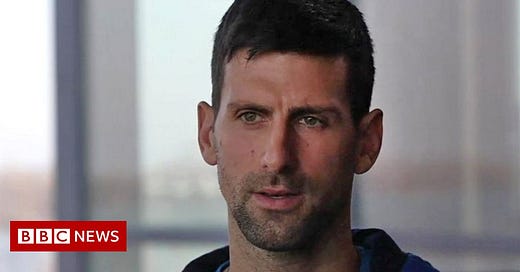Yesterday morning my phone pinged with the news that Russian troops were possibly pulling back from the Ukraine border. So I wasn’t surprised when the BBC Lunchtime News led with an interview of an important player from Eastern Europe. They were labelling it an “exclusive”. But I was surprised, and a little shocked, that the interview was with Novak Djokovic (talking about invasion by vaccine, not by Russia). And even more surprised in the evening when thirty minutes was taken out of the BBC’s primetime schedule to screen yet more of the interview.
I’m a big tennis fan. Back in January, I was glued to coverage of Djokovic’s thrilling on-court tussle with the Australian government. I even downloaded several of the legal documents to get a better understanding of the evolving scoreline. (I do stuff like that.) But what on earth did the Beeb think was the breaking news story yesterday?
When asked why he wasn’t vaccinated, Djokovic responded with a little homily about personal control over one’s own body. It was clear that he believes strongly in this notion. But it wasn’t an answer to the question. It might be an explanation for why he thinks it is OK to value his personal autonomy over the collective good. But it wasn’t an explanation – or even an attempt at an explanation – as to why he exercises his personal freedom by choosing not to have the vaccine in his body as opposed to having it.
The interviewer, BBC’s Media Editor Amol Rajan, allowed Djokovic to get away with the evasion. And then Rajan went on to feed Djokovic answers to other questions. For example, instead of asking Djokovic why he went to a tennis event for children on the day after he had tested positive for Covid, Rajan offered Djokovic a reason for doing so (“You weren’t told of that PCR result?”) and invited Djokovic to agree. There were several exchanges in that format. On the day when Prince Andrew was back in the news on account of his own court case, this was no Emily Maitlis-style encounter. (“Why weren’t you told? Who was the PCR result sent to if not to you? Did they know you would be visiting children when they failed to tell you the result?” These are questions I would have imagined Maitlis putting to Djokovic.)
Djokovic has had Covid (more than once, he tells us). So the virus has been in his body. It would have been interesting to have confirmation that he did not choose to allow it there … and then to hear him explain why he prefers the virus to have access to his body without any protection. If he truly believes that virus-plus-vaccine is more dangerous than the virus on its own, it really would have been news to hear his reasoning. Has he heard of long Covid? But Amol Rajan didn’t play that ball.
There was reference more than once to Djokovic being an “elite athlete” – it was Djokovic’s own description, but one could hardly begrudge him that assessment – and that is why he believes his body has to be protected. But refusing the vaccine has resulted in him being denied participation in one Grand Slam already and risks him being denied entry to others. He said he was willing to take that risk even if it meant missing out on a place in history as the winner of more Grand Slams than any other male player. But one has to wonder what is the point of “protecting” (as he sees it) his body for elite sports if the elite sporting tournaments won’t allow him to enter as a result of the protective measures he takes – or, should I say, the protective measure he won’t take.
It really didn’t add up. I was left with the clear impression that Djokovic has reasons that he doesn’t want to disclose. But why, then, did he agree to the interview? And why did the BBC send their Media Editor, rather than someone from Sport, Health or News? Even Graham Norton would have followed through better on the interview And likely tipped Djokovic out of his chair for failing to answer.
This analysis reached you free of charge. Subscribe now to make sure you never miss any of my Irregular Thoughts. And share this particular thought with others so that they can read it.





